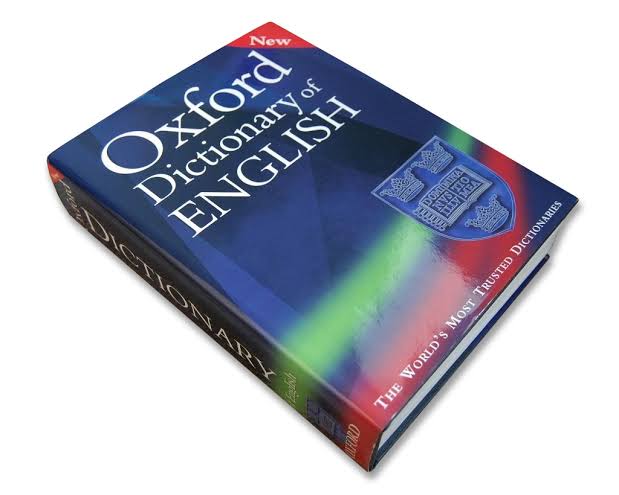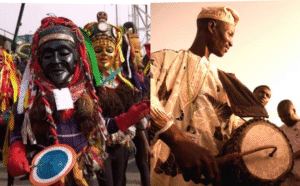The Oxford English Dictionary (OED) has included 20 Nigerian words and expressions in its latest update, expanding its collection with terms that reflect Nigeria’s culture and language.
The new entries feature widely recognized words like japa, agbero, eba, 419, and abi. These terms, which are deeply embedded in Nigeria’s everyday conversations, demonstrate the growing global recognition of Pidgin English, street slang, and cultural phrases.
Interestingly, some of the additions, such as japa and jand, are listed as both nouns and verbs in the dictionary. To help non-Nigerians pronounce these words correctly, the dictionary has also provided pronunciation guides.
Kingsley Ugwuanyi, a Nigerian English consultant for the OED, shared the update on LinkedIn. He expressed his excitement about contributing to the drafting and pronunciation recordings of these words.
Ugwuanyi stated,
“I’m thrilled to announce that the Oxford English Dictionary (OED) has published its latest updates, featuring an amazing collection of Nigerian English words that reflect Nigeria’s culture, creativity, and unique expressions. This time, I not only drafted most of the words but also recorded their pronunciations. When you explore the OED online and click on the pronunciations, you’ll hear my voice bringing these words to life.”
Highlighting Nigerian Words
Among the additions, japa is defined as the act of leaving Nigeria, often for Europe or North America, to seek better opportunities in education, employment, or the economy.
The word agbero refers to a person, typically a young man, working as a tout at bus stops or motor parks. These individuals collect fees from passengers or drivers and assist travelers in finding vehicles.
Another term, 419, describes fraudulent activities often conducted online. It refers to schemes that involve requesting upfront payments in exchange for large sums of money that are never delivered. For instance, phrases like “419 email” and “419 scam” are examples of its usage.
Full List of Nigerian Words Added to the OED
Below is the complete list of words and phrases recently added to the Oxford English Dictionary:
- 419
- abi
- adire
- agbero
- area boy
- cross-carpet
- cross-carpeting
- eba
- Edo
- gele
- jand (noun, verb)
- janded (adjective)
- japa (noun, verb)
- Kanuri
- kobo
- Naija
- suya
- Yahoo
- yahoo boy
- yarn dust
Cultural Significance
The inclusion of these words in the Oxford English Dictionary highlights the global recognition of Nigerian English and its cultural impact. These terms are not just words but stories and expressions that reflect Nigeria’s vibrant society, creativity, and linguistic richness.
The update also serves as a reminder of how language evolves and adapts. Nigerian English, deeply influenced by local languages and cultures, continues to make its mark on global lexicons.
Meaning of the Words
Each word in this list represents an aspect of Nigerian life, history, or culture. For example:
1. 419
Refers to fraudulent activities, especially scams that ask for advance payments in exchange for fake promises of large sums of money. The name comes from Section 419 of Nigeria’s Criminal Code, which addresses fraud.
2. Abi
A common expression in Nigerian Pidgin, used to seek confirmation or agreement. It is equivalent to “right?” or “isn’t it?” in English.
Example: You go come today, abi? (You’ll come today, right?)
3. Adire
A type of traditional Nigerian fabric that is tie-dyed with intricate patterns. It is popular in Yoruba culture.
4. Agbero
A slang term for touts or bus stop workers who assist passengers in finding vehicles, collect fares from drivers, and sometimes enforce informal transport rules.
5. Area Boy
Refers to a group of young men or boys, often unemployed, who are associated with street life and sometimes engage in petty crimes or serve as informal laborers.
6. Cross-Carpet
Describes the act of switching political allegiance, particularly when a politician moves from one party to another.
7. Cross-Carpeting
The process or action of switching political parties, often for personal or strategic reasons.
Related Posts
8. Eba
A staple Nigerian food made from garri (processed cassava flour) mixed with hot water to form a dough-like consistency. It is often eaten with soups like egusi or ogbono.
9. Edo
Refers to the people, language, and culture of Edo State in southern Nigeria.
10. Gele
A traditional Nigerian headwrap worn by women, especially for special occasions like weddings or religious gatherings. It is tied in elaborate styles.
11. Jand
A Nigerian slang term for the United Kingdom. It can also be used as a verb to mean traveling to the UK.
Example: I just dey come from jand. (I just returned from the UK.)
12. Janded
An adjective that describes someone who has been to or lived in the UK. It can imply being exposed to British culture or having a posh demeanor.
13. Japa
A popular Nigerian slang term that means to flee or escape, often used to describe emigration in search of better opportunities abroad.
Example: Many people wan japa from Naija. (Many people want to leave Nigeria.)
14. Kanuri
Refers to the ethnic group and language spoken predominantly in northeastern Nigeria and neighboring countries like Chad and Niger.
15. Kobo
The smallest unit of the Nigerian currency, the naira. It is equivalent to a cent in the dollar system.
16. Naija
A colloquial name for Nigeria, often used affectionately or informally.
Example: Naija no dey carry last. (Nigeria doesn’t come last.)
17. Suya
A popular Nigerian street food made from skewered and spiced grilled meat, often beef or chicken, served with onions and pepper sauce.
18. Yahoo
A term associated with internet fraud or cyber scams. It is often used to describe fraudulent activities carried out online.
19. Yahoo Boy
A person who engages in internet fraud or cyber scams, often targeting victims through deceitful emails or messages.
20. Yarn Dust
A slang phrase meaning to speak nonsensically or boast without substance.
Example: No yarn dust for here. (Don’t talk nonsense here.)
Pronunciation and Usage
For those unfamiliar with these terms, the pronunciation guides provided by the OED ensure accurate articulation. This makes it easier for non-Nigerians to adopt and use these words correctly.
Conclusion
The addition of Nigerian words to the Oxford English Dictionary showcases Nigeria’s influence on global language and culture. By including these words, the OED has acknowledged the richness of Nigerian English and its contributions to the global linguistic community.
Share this:
- Click to share on Facebook (Opens in new window) Facebook
- Click to share on X (Opens in new window) X
- Click to share on LinkedIn (Opens in new window) LinkedIn
- Click to share on Pinterest (Opens in new window) Pinterest
- Click to share on Telegram (Opens in new window) Telegram
- Click to share on WhatsApp (Opens in new window) WhatsApp




